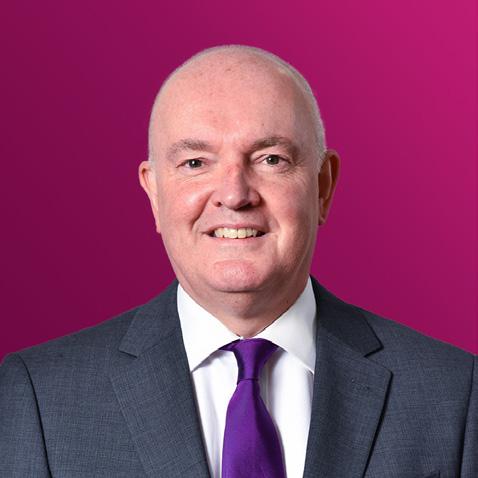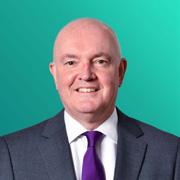Your investment update

2023
Q3
This document has been produced by Seven Investment Management LLP from internal and external data. Any reference to specific instruments within this document are part of widely diversified portfolios and do not constitute an investment recommendation. You should not rely on it as investment advice or act upon it and should address any questions to your financial adviser. The value of investments can vary and you may get back less than you invested.
Contents Welcome Holding our nerve Martyn Surguy Chief Investment Officer Strategy If I were an influencer Ahmer Tirmizi Head of Fixed Income Strategy Special feature Seven insights for 2023 Terence Moll Head of Investment Strategy Culture & sustainability Where have all the wellies gone? Jack Turner Head of ESG Portfolio Management Visit us at www.7im.co.uk to find out more about our latest news and views. 04 06 10 16 Your Investment Update – Q3 2023 3
Holding our nerve
At the turn of the year we were concerned on a number of fronts. Interest rates had risen sharply and were heading higher. Inflation was high and likely to be sticky. Corporate performance had been strong but headwinds were growing. At the half-year point, if anything, we’re more concerned about all those issues as news has worsened in nearly all cases. But to look at financial markets you’d be forgiven for thinking all was plain sailing. Global equity markets are up sharply and international bond markets are nicely ahead. Only UK assets haven’t really joined the party.
So, what’s going on? And how should we respond? For the former, it remains our view that difficult times are coming, driven by the delayed impact of rate rises and the likely onset of poorer corporate profitability. For the latter, our answer will always be to trust our investment identity and never lose sight of our overwhelming priority to preserve capital through time. Clearly our defensive positioning becomes increasingly challenging the better markets perform, and our emotions tell us that we are missing out.
Patience and discipline are key to generating long-term returns. We’re unashamedly conservative. We worry about drawdowns. We won’t chase markets when we don’t feel that is warranted by fundamentals as we don’t at present. Our portfolios are properly diversified. Exposures are very well spread. We avoid excessive concentration, and traditional asset classes (equity, bonds, cash) are balanced with alternative ones. We think that’s the right approach. We’re antifashion.
Welcome
4 Your Investment Update – Q3 2023
If something’s just performed extraordinarily well it’s simply unlikely to interest us. That’s how we feel about technology right now. Of course, artificial intelligence will be transformative to our lives over time, but the long-term winners are difficult to identify. In our view, the extreme levels of valuation for many of the shortterm “winners” are impossible to justify.
Our approach has been consistent, but it has not been rewarding thus far in 2023. This happens from time to time, but we can see no good reason for abandoning the principles that have served us well. We’re confident in our identity, and we’re confident in what it will deliver for our clients.

In the following pages, Ahmer Tirmizi takes a look at high cash rates and why investors should be wary of being tempted into making a poor long-term decision. Terence Moll shares seven insights from the year so far, while Jack Turner looks at climate change through the lens of a Glastonbury-goer.
We hope you enjoy reading, and that you take advantage of the sunshine. Have a great summer!
So, what’s going on? And how should we respond? For the former, it remains our view that difficult times are coming, driven by the delayed impact of rate rises and the likely onset of poorer corporate profitability."
Chief Investment Officer
MARTYN SURGUY
5 Your Investment Update – Q3 2023
Strategy
If you’re on the ‘socials’, your timeline will fill up with content you like. At least, it’ll fill up with content the algorithms think you like. Whether you’re into working out, cooking or trainspotting, there’ll always be a post ready for you. Different content providers and influencers will find ways to hook people into their channels.
An easy way to do this is to have a clickable title. Gym-goers won’t be interested in “How alcohol negatively impacts hypertrophy ”. But “How drinking KILLS your gains! ” will generate plenty of clicks.
Another way to do this is through a simple countdown: “Five things I wish I knew before I started the gym” or “The three most import kitchen items” or “Top 10 trains in Europe”.
It made me wonder: what if I were an investing influencer? What would be my hook? Well, with UK interest rates where they are, mine would be “Three BIG problems with cash ”.
It’s crucial to remember that portfolio returns don’t happen in nice, neat segments but are unpredictable and lumpy. The risk of moving to cash is that you miss out on the big years.”
6 Your Investment Update – Q3 2023
If I were an influencer
The natural order of things is for cash to lose against every other investment
Multi-asset portfolios are made up from different asset classes. In the most traditional form, these tend to be government bonds, corporate bonds and equities. These aren’t just pieces of paper with a theoretical value, but rather one side of a mutually beneficial transaction. You, as an investor, are looking for a return on your money, while on the other side there is someone who needs that money and is willing to pay you for it!
And these companies and governments that need your money have to offer you more than a cash return … otherwise you’d just hold cash. And the return you get tends to line up with the risk you take – the less certain the outcome, the more you’ll want to tempt yourself away from cash. And this isn’t just theory (see box, page 9).
The upshot is that those financial assets are designed to deliver returns higher than cash – that’s the minimum they have to deliver! This means multi-asset portfolios, by design, should also beat cash over the long run.
You give up predictability for higher returns
The comfort of cash is alluring. You know exactly the return you’ll get (sometimes to multiple decimal places), the journey that return will take and over what time. So, when interest rates are high (as they are now), it’s tempting to move long-term savings into cash. After all, what are the chances that a multi-asset portfolio is going to beat that over the next year or two? I mean, aren’t we headed for a recession anyway?
The problem is that asset class returns are unpredictable. Take US equities: on average, equities are supposed to deliver around 10% a year. But how many of the last 50 years have the returns of US equities actually been 10% (or say 2% either side)? The answer is three. Just three!
Most people think that, when cash rates are high (say today’s 5%), they are willing to give up the ruleof-thumb 10% return from equities – it’s not that big a difference and it’s only for a year or two. But what if I said that nearly a quarter of the last 50 years have seen returns of 20% or more? Moving to cash risks missing out on these returns.
It’s crucial to remember that portfolio returns don’t happen in nice, neat segments but are unpredictable and lumpy. The risk of moving to cash is that you miss out on the big years. Those big years make up for the smaller years. Therefore, missing out on those will impact your overall longterm returns. The problem is, it’s difficult to know when those big years are likely to be.
The key is to stick to your investment plan, even when uncertainty is high. Strong years will often follow the worst ones, meaning over the long run your portfolio should beat cash. >>
of Fixed Income Strategy

AHMER TIRMIZI
1
Head
2
7 Your Investment Update – Q3 2023
Your biases can be to the detriment of your longterm returns
With all the negative headlines out there – Russia this, AI that, inflation the other – it feels like a poor environment for investors to make returns. ‘I’ll just park into cash for this year, see out the storm and then invest when things look a little rosier’. Let’s play out a couple of thought experiments:
Scenario 1 – markets down, cash wins. Most investors imagine in that scenario they will act rationally – “markets are down, they look more attractive, I was right, but I won’t ride my luck anymore, so let’s move cash back into the markets”. The truth is this is very rarely how it plays out. Most investors tend to be led by markets. If markets are falling, it means uncertainty is high and they tend to be followed by scary “$X billion has been wiped off the stock market ” headlines. The result is that investors sit out for a while longer, missing out on the recovery, often to the detriment of their longterm savings goals.
Scenario 2 – markets up, cash loses. Most investors imagine in this scenario they will act graciously, accept defeat and move back to investing, chalking it up to one bad call. Instead, investors will tend to see markets up, climbing the so-called ‘wall of worry’, against their own expectations. When one gets a call wrong, it is tempting to believe it’s the market that’s actually wrong – perhaps it’s got ahead of itself, so let’s sit out a while longer. The result is missing out on new highs, often to the detriment of their long-term savings goals.
These sound like theoretical scenarios, but they are outcomes of long-term studies. One of the longestrunning of these is the Dalbar QAIB1 survey. The report looks at the average US investor returns compared to if they had just invested passively in the index of large US companies.
The study found that since 1992 investors on average earned 3.5% per year less than if they had just left their money untouched.
Investors often change their investment plans, not based on their goals but on current market and news. And the impact is huge! These changes –whether into cash or into a new manager or a new style – are often… you guessed it… to the detriment of their long-term savings goals.
Away from social media
Putting it all together, moving a long-term investment pot to cash isn’t wise. But that’s not clickbait; we’re not saying something controversial just to make a splash. It’s the right way to think about things – and at 7IM we do exactly that, regardless of whether it gets us any attention.
A typical 7IM Cautious portfolio will have around half of it lending to safe governments and companies. Today’s yields are not that far off cash rates, but they have the benefit of locking in a longterm gain over cash.
Our market-leading alternatives portfolio (employing strategies that look to diversify from traditional assets) is designed to deliver a ‘cash+’ return. And while the rest of the portfolio will be in equities and lending to smaller companies, which can be a little uncertain over the short-term, the quid pro quo is that they give you the best chance of reaching your savings goals once the period of an uncertainty passes. It’s put together to beat cash, as long as you are patient.
Resisting the temptations to move long-term investments pots into cash puts you on the right side of how the world works.
Strategy Continued 1
https://www.dalbar.com/ProductsAndServices/QAIB
3
8 Your Investment Update – Q3 2023
Cash is the lowest common denominator
The financial assets you are investing in are just a contract between you and a company or government. What’s key is that to tempt you away from cash, they need to offer a better return. Additionally, the risker the company or government is, the more return you should receive. This is the natural order in investing, and one you can use to your benefit by staying invested over the long run.
According to a long-term study2, since the 1900s investing in US companies has delivered a return of almost 6% per year higher than cash. But it’s not just the ‘riskiest’ investments either. Lending to Uncle Sam has delivered returns over 1% higher than cash. It might not sound like a lot, but if cash can’t even win against the safest investments out there, why would you hold it?
Average returns of individual asset classes vs cash over the long-run
https://www.credit-suisse.com/about-us-news/en/articles/news-and-expertise/global-investment-returns-yearbook-2023-202302.html
2
1.30% 2.20% 3.30% 5.90% 0.00% 1.00% 2.00% 3.00% 4.00% 5.00% 6.00% 7.00% US Government Bonds Return relative to cash 1900-2021 US Investment Grade 1976-2021 US High Yield 1983-2021 US Equities 1900-2021 Excess returns over cash, per year
9 Your Investment Update – Q3 2023
Source: 7IM, Bloomberg Finance L.P., CS.
Special
Seven insights for 2023
Halfway through 2023, it's worth highlighting a few things that have caught our attention
1 UK debt to 1688
You may have seen that the UK government debt/GDP ratio hit 100.1% in May 2023. Lots of people became very excited about this, noting that it was at the highest level since the 1960s, and suggesting that government spending was heading out of control. But if you’re going to look at history, why not look as far back as possible? Going back to 1699 and the reign of William of Orange, we can see that government debt/GDP ratios have fluctuated over time – usually rising in response to crises or wars, and then edging downwards again. There have been several economic and political crises in recent years; perhaps the rise in debt isn’t that surprising after all…
feature UK Government Debt/GDP Source: Bank of England: A millennium of macroeconomic data/7IM 100.1% 0% 50% 100% 150% 200% 250% 300% 1699171217251738175117641777179018031816182918421855186818811894190719201933194619561972198519982011
10 Your Investment Update – Q3 2023
2
Electric vehicle chargers need lots of copper
Europe has grand plans to reduce transport emissions by adopting electric vehicles (EVs). About one in five of its new car sales in 2021 was an EV. But the EV drive requires lots of supportive infrastructure – to charge the EV fleet, and to give non-EV drivers the confidence to buy an EV.

To meet official emission goals, McKinsey reckons Europe needs 1.7m public charging points to be installed by 2025, and 3.4m by 2030. These are gigantic increases.
Public electric vehicle charging points in Europe
That’s one of the reasons we are optimistic about metal prices and mining companies, since every charger requires about 3.5kg of copper, plus aluminium and steel and other metals. Not to mention the metals in solar and wind power stations, power lines, and the EVs themselves. Copper could be the new oil3, says Goldman Sachs, exaggerating only slightly. >> 3 https://www.goldmansachs.com/intelligence/pages/copper-is-the-new-oil.html
Head of Investment Strategy TERENCE MOLL
2030 2025 2021 200,000 Actual 1,700,000 3,400,000 Required to meet Europe’s electric vehicle goals 11 Your Investment Update – Q3 2023
Source: McKinsey, ‘Europe’s EV opportunity—and the charging infrastructure needed to meet it,’ 4 Nov. 2022.
Special feature Continued 3
Profit-led inflation – have companies been milking it?
Nobody seems to know what has been driving the surge in world inflation of the last two years. Was it global supply chains? Or feckless governments? Labour shortages are part of the story. And Putin’s war. Was the UK’s experience exacerbated by Brexit?
But don’t forget pure, unashamed capitalism. Take the price of milk in the UK. Over most of the last 30 years, the markup that supermarkets charge over the price farmers receive has hovered between 25p and 35p. Then it suddenly shot up just after Covid.
The UK milk markup
Why? Did lockdowns shift up the demand for milk? Was there a milk shortage? Or were supermarkets taking advantage of inflation uncertainty? When nobody knows what’s going on, why not grab some extra profits?
That uncertainty is starting to settle now –and farmers are already lowering their prices (down 20% from peaks!). The markups could also start falling soon, bringing inflation and profits down too.
Average UK retail price of milk less the farmgate price; pence per pint
Source: ONS, UK Dept for Environment, Food & Rural Affairs
20p 25p 30p 34p 40p 45p 50p 1992 1995 1998 2001 2004 2007 2010 2013 2016 2019 2022
12 Your Investment Update – Q3 2023
Saving and investing
Cash rates of 5%-plus are a tempting option for many people. But not for the long run. If Ahmer’s Strategy piece from earlier hasn’t convinced you, how about the wisdom of two successful investors?
The chunky chip at the heart of AI
In late 2020, Nvidia released the A100 computer chip. It has 54bn transistors and is able to process a gigantic amount of info. While iPhone chips are the size of a fingernail, the A100 is a real bruiser.
It costs about $10,000 and has been widely used to develop and train artificial intelligence (AI) systems, leading to Nvidia’s share price more than doubling in the first half of 2023. The stock is now trading at a price-earnings ratio of around 200, which is stratospheric. Investors are spectacularly optimistic about its prospects.
We asked ChatGPT for a poem about the A100 and AI:
The Luminary Chip
In realms of AI, Nvidia's gem gleams, A100 chip, fulfilling grandest dreams. With blazing speed, it unlocks new doors, Unleashing potential, the world explores.
Deep learning's ally, it leads the way, Revolutionising tech day by day. Nvidia's A100, a vital part, Fuelling AI's rise, a work of art.
Hmmm. Not bad, but not great either. AI will have a huge impact on the world eventually, but the human brain is not redundant quite yet. >>
4
5
Anyone who is not investing now is missing a tremendous opportunity."
3cm
Carlos Slim
How many millionaires do you know who have become wealthy by investing in savings accounts?"
Robert G. Allen
Credit: Neo – stock.adobe.com 13 Your Investment Update – Q3 2023
Special feature Continued 6
Austria’s 100-year disaster
In 2017, Austria issued a 100-year bond, with a yield of 2.1%. As interest rates fell in the following couple of years, and even further during Covid, the price of the bond went from €100 to nearly €250. Those were generous returns for any asset, let alone a government bond.
But as rates have risen more recently, that bond has become less and less attractive. Who wants to lock in 1% or less for a century? Today, the bond trades at around €70. That’s a big loss if you bought it when it was issued at €100. It’s appalling if you bought it at €230 – down 70% on a government bond!
Price of Austrian 100-year bond
Source: Bloomberg L.P. €0 €50 €100 €150 €200 €250 Sep 17 Mar 18 Sep 18 Mar 19 Sep 19 Mar 20 Sep 20 Mar 21 Sep 21 Mar 22 Sep 22 Mar 23 14 Your Investment Update – Q3 2023
And now for something completely different…
7
How thick is the Carpet of Life?
If we took every living thing on Earth, from trees to mushrooms to ferns, blue whales to people to amoebae, pressed them into a thick carpet and spread it around the surface of the globe...
That Carpet of Life4 would be only 4.3mm thick. It would be half as thick as the Samsung Galaxy A13 phone.
On a global scale, the Carpet of Life is very thin indeed.
Why? Because much of the Earth is devoid of life. Most of the seas and oceans are empty, especially far from the coast and in the tropics. Deserts like Antarctica and the Sahara make up one third of the world’s land area… and have just a few penguins, lizards and shrubs.
Meanwhile, human habitats are filled with people, dogs and cats, but are often concrete wastelands for wildlife where only pigeons and weeds flourish.
4 More information about the Carpet of Life, including the references used, can be found here: https://www.howandwhy.com/ideas/how-thick-isthe-carpet-of-life 15 Your Investment Update – Q3 2023
Culture & sustainability
Where have all the wellies gone?
If you’re like me, you might have spent last month jealously looking at people having the time of their lives at the music festival Glastonbury. I normally can’t watch due to enormous levels of FOMO (Fear Of Missing Out), but this year was an exception.
Alongside enjoying the amazing performances (Elton John anyone?!), one thing that struck me was how sunny it was. My memories of the Glastonbury Festivals of the early 2000s are of people wading through biblical levels of mud and generally having a miserable time. But this year it was shorts, t-shirts, and sunglasses everywhere! Not a welly in sight.
It turns out it hasn’t rained at the last four Glastonbury Festivals. Searing temperatures in 2022 and 2019 dethroned 2017 as the hottest Glastonbury on record. At this year’s event, it was so hot that showers were closed to preserve water! For me, this is another example of how climate change is impacting our daily lives.
Climate change — or Climate Risk, as we like to call it within investment management — is something we try and manage within the 7IM portfolios. One way we do this is through our target to reduce the carbon intensity of our strategic asset allocation (SAA) by 30% by 2026. We target the SAA because this is the cornerstone of our investment process and influences all the portfolios run by 7IM.
16 Your Investment Update – Q3 2023
This target aims to tilt our investments away from the most polluting companies and favour companies with cleaner production processes and supply chains. This doesn’t mean excluding every company with a link to fossil fuels, but it does mean removing those companies using these resources most inefficiently.
Thus far we have begun decarbonising our holdings in US equities and Global Corporate bonds, impacting more than £500m of assets. This year we have been analysing the impact of doing the same for Japanese and European equities, and aim to make further changes to portfolios when we update the SAA later in Q3.
Climate change will impact everybody over the coming years. We’ve all had moments when little details have illustrated how the weather is changing. For some of us, it might be that our local stream is running much lower than normal, or that our favourite winter coat is staying in the wardrobe that much longer. For me, it was watching 200,000 sunburnt people at Glastonbury having the time of their lives.

We target the SAA because this is the cornerstone of our investment process and influences all the portfolios run by 7IM."
of ESG Portfolio Management JACK TURNER 17 Your Investment Update – Q3 2023
Head
Meet the teams
Investment Management Team
Martyn Surguy Chief Investment Officer
ACA Chartered Accountant, MCSI, CISI Level 4, 35 years of industry experience.

Matthew Yeates Deputy Chief Investment Officer CFA, FRM, BA Economics, 11 years of industry experience.
Uwe Ketelsen Head of Portfolio Management MEcon, CFA, 26 years of industry experience.
Terence Moll Head of Investment Strategy and ESG MPhil, PhD. in Economics, 31 years of industry experience.
Duncan Blyth Senior Investment Manager BSc Actuarial Mathematics & Statistics, CFA, 26 years of industry experience.

Hugo Brown Investment Analyst – Alternatives BEng, CFA level 3 Candidate, 4 years of industry experience.
Christopher Cowell Senior Quantitative Investment Strategist MSc, PhD, CFA, 6 years of industry experience.

Ross Brydon Investment Implementation Manager BA in Finance, 4 years of industry experience.





Fiammetta Valentini Investment Manager MSc in Accounting, Financial Management and Control, 4 years of industry experience.

Tiziano Hu Quantitative Investment Strategist – Multi Asset MSc in Financial Technology, 2 years of industry experience.

Ben Kumar Head of Equity Strategy CFA, MSc Behavioural Economics, 10 years of industry experience.
Tony Lawrence Head of Model Portfolio Management CFA and CAIA, 21 years of industry experience.
Stephen Penfold Senior Investment Manager BSc in Economics & Computing, 36 years of industry experience.



Peter Sleep Senior Investment Manager 30 years of industry experience.
Ahmer Tirmizi Head of Fixed Income Strategy MSc in Economics and Finance, 15 years of industry experience.



Jack Turner Head of ESG Portfolio Management CFA, 14 years of industry experience.

Wenqian Zeng Junior ESG Investment Analyst MSc in Climate Change, Management and Finance, BSc in Management, 1 year of industry experience.

Risk Team
Joe Cooper
Head of Risk and Portfolio Analytics

CFA, MSc in Applied Economics, 11 years of industry experience.
Loic Yegba
Investment Risk Developer
MSc Mechanical Engineering, CFA level 3 candidate.
William Wood
Investment Risk and Performance Analyst
BSc in Physics, 4 years of industry experience.
Matthew Hall
Investment Risk & Performance Analyst
MSc Finance, 2 years industry experience.




Seven Investment Management LLP is authorised and regulated by the Financial Conduct Authority. Member of the London Stock Exchange. Registered office: 1 Angel Court, London EC2R 7HJ. Registered in England and Wales number OC378740. www.7im.co.uk




























